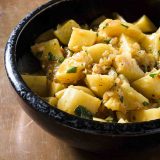Half a chicken and a pan of garlicky, wine-simmered potatoes, all of it cooked in a stone fireplace so large two people could stand inside it. It was the honeymoon menu for Ana Patuleia Ortins some 50 years ago, and the appeal of those potatoes—and that massive fireplace— remains as strong today.
“The opening was taller than me, probably 10 feet wide,” says Patuleia Ortins, author of “Authentic Portuguese Cooking.” “It had a grate with the pan on the fire, and there was a cat nearby waiting for something to drop.”
Batatas cozidas em vinho e alhos varies by region and family, but the heart of the recipe is consistent: potatoes, onions, garlic and olive oil. First the onions and garlic are cooked until jammy-sweet, then the potatoes are added and simmered in white wine to add wonderful acidity to balance the starchiness.
Patuleia Ortins says other typical elements include paprika for color and richness, plus another common pantry ingredient, a pepper paste made from cured, fiery bird’s eye chilies. Her father made his own with a meat grinder.
In her recipe, Patuleia Ortins cooks the onions until softened, then mixes in garlic, bay, paprika and chili paste. Cubed potatoes are stirred in and coated with the seasonings, then simmered, covered, until tender. Later, the pot simmers uncovered to let the liquid evaporate and concentrate the flavors. A sprinkling of chopped fresh parsley or cilantro finishes the deeply satisfying dish.
We loved the delicious simplicity of the flavors, which amount to much more than the sum of their parts. Except that cooking in wine can sometimes toughen the exterior of potatoes. That’s because the wine can draw out liquid from inside the potato cells near the surface, causing them to shrink and form a tough barrier. So we sought a way to ensure perfect results every time.
And it turned out to be as simple as the recipe itself. Cutting the wine with chicken broth, which also added richness, helped block the dehydration effect of the alcohol. And without a meat grinder for freshly ground chili paste, we substitute jarred crushed peppers or red pepper flakes.
“The thing that people don’t understand about Portuguese cooking is that it’s flexible,” she says. “The way they say it, it’s ‘com gusto.’ It’s how you like it.”
“The way they say it, it’s ‘com gusto.’ It’s how you like it.”







